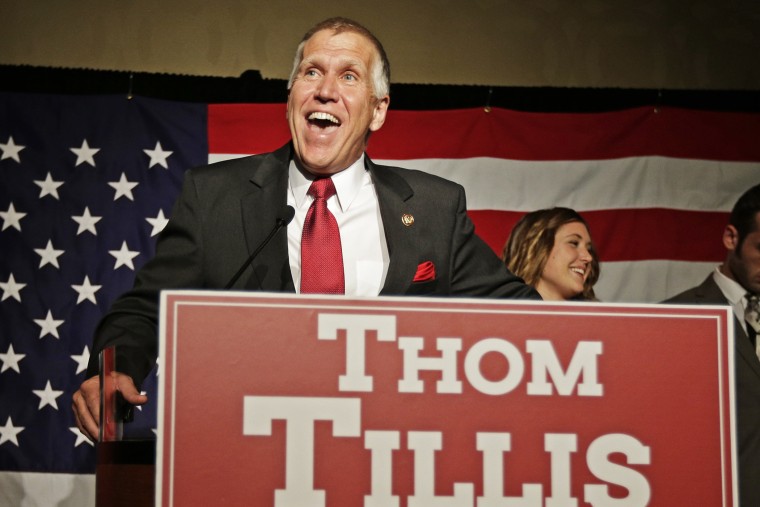Every Saturday morning, President Obama makes
a weekly address to the nation, which usually runs a few minutes long and tackles a major subject in the news. It used to be known as the weekly radio address, but in 2009, Obama took the enterprise online.
Of course, in the interest of fair play, the minority party gets its own address, which means Republican officials release their own video every Saturday morning, featuring their own message and messenger. And this week, the GOP put U.S. Senate candidate Thom Tillis (R-N.C.)
in the spotlight.
The North Carolina Republican made a series of odd arguments, but it was his condemnation of the White House's foreign policy that stood out.
"As we look at the crises boiling over across the globe, we see a president who has been leading from behind with a failed foreign policy that has weakened America. "Iran is getting closer and closer to developing a nuclear weapon. Russia continues to infringe upon the sovereignty of Ukraine. Our ally Israel is being attacked by terrorist groups. And the president still doesn't have a strategy to destroy the terrorist group known as the Islamic State."
The notion that the president doesn't have an ISIS strategy is bizarre given the prime-time address the president made in September in which he
outlined his ISIS strategy. How a prominent U.S. Senate candidate in a competitive race missed that is a bit of a mystery. Shouldn't one of his aides have read Tillis' remarks before he said something so foolish in a national address?
What's more, Iran is not getting closer to a nuclear weapon, and while recent events in Ukraine and Israel are alarming, blaming American officials for all discouraging developments in the world is absurd.
But specifics aside, listening to the far-right North Carolinian, Tillis has a problem with Obama's approach to international affairs on a more fundamental level. The candidate is opposed, he said, to a "foreign policy that has weakened America."
And what is it, exactly, about Obama's foreign policy that Tillis finds so offensive? He has absolutely no idea.
The Republican was asked last week, for example, about Obama's plan to support Syrian rebels. Tillis disapproves of Obama's foreign policy in general, but
does he think this is wise?
Tillis has said the U.S. doesn't know enough about who the moderate rebels are and whether it's a good idea to arm them. "I actually don't know if we should or shouldn't," Tillis said this week.
Oh. Well, how about Obama ordering military strikes on Islamic State targets in Iraq and Syria? On this, Tillis actually thinks the president's foreign policy
is spot on.
OK, but what about ground troops? Tillis
said he'll "make a decision based on the information" after he's briefed on the subject.
As
Simon Maloy put it, "And now you see the problems start to emerge. How can Obama's (and Hagan's) policy be dangerous and irresponsible when Tillis himself backs one portion of Obama's strategy and isn't sure on another?"
If it seems as if this comes up all the time, that's because it does. Republicans hate the Affordable Care Act, but balk at offering an alternative. They hate comprehensive immigration reform, but have no solution of their own. They hate Obama's foreign policy, except for the parts they agree with, and the parts they're not quite sure about.
When it comes to the search for solutions to complex policy challenges, it seems some political figures are interested in "leading from behind," but it's not the president.
In certain respect, Tillis is right -- these are very difficult questions that require careful deliberation and considered debate. But he's attacking his opponent for being insufficiently proactive in the face of an emerging threat and for pursuing policies that he thinks are wrong and dangerous. And his answer to what he'd do differently, beyond rote platitudes about leadership, is "I don't know."
That'd be a less offensive response if we didn't hear it quite so often.
